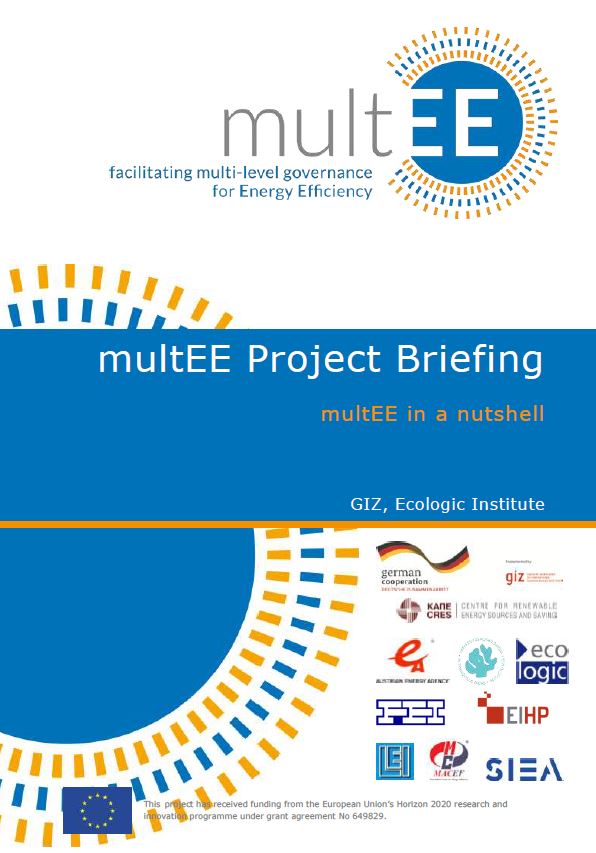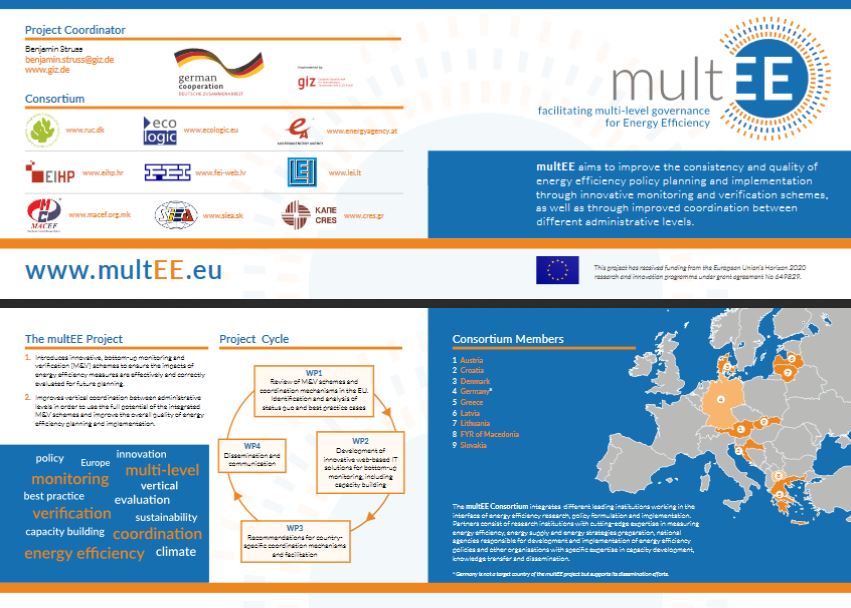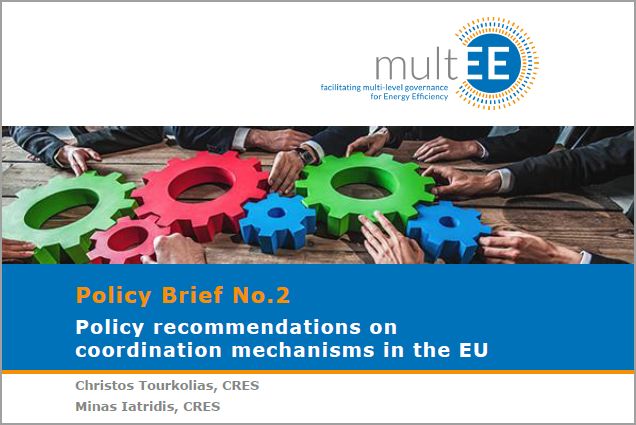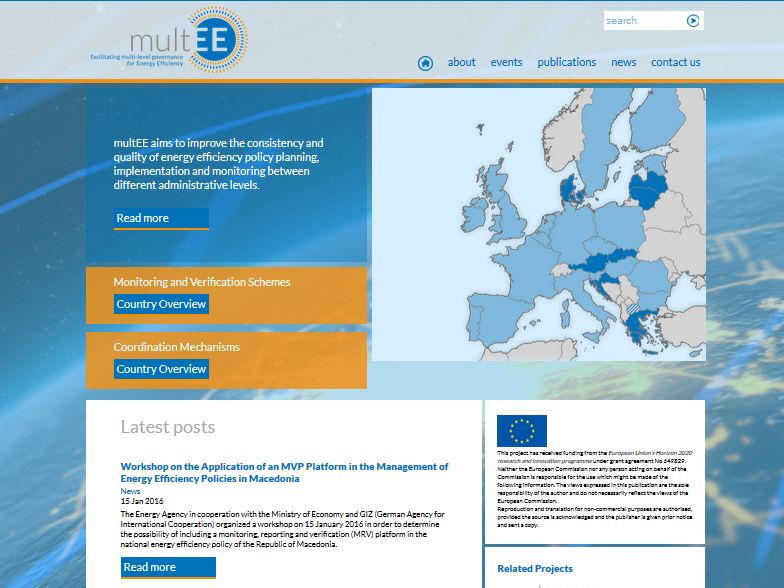Multi-level Governance of Energy Efficiency – multEE final conference
- Event
- Date
-
- Location
- Vienna, Austria
On 29 June 2017 Ecologic Institute, together with the multEE consortium and the Energy Community Secretariat, held their final conference at the Sofitel in Vienna. The event served as an interactive forum for exchange and joint learning. A lively participatory approach was adopted to summarize and review all of the project's achievements and impacts to date, while paving the way for future cooperation. The presentation slides are available for download.
The conference was organized back-to-back with the triannual meeting of their Energy Efficiency Coordination Group of the Energy Community (EnC), which brings together the EU and its neighbours to contribute to an integrated pan-European energy market. Led by Deutsche Gesellschaft für Internationale Zusammenarbeit (GIZ) through its Open Regional Fund for South-East Europe-Energy Efficiency, multEE brought together ten partners from nine European countries and integrated different leading institutions working at the interface of energy efficiency research, policy design and implementation.
The multEE project - Facilitating multi-level governance for Energy Efficiency, aimed to improve the consistency and quality of energy efficiency policy planning and implementation.
The project pursued two streams of action: 1) develop and implement innovative monitoring and verification (M&V) schemes, and 2) improve coordination of the design and implementation of energy policies both horizontally among national government bodies and vertically between different administrative levels.
Both EU Members States and Energy Community countries require further work on these two pillars to successfully implement the proposed governance framework of the Energy Union. The multEE project makes an important conceptual and practical contribution to this effort.
Fitting well into the actual political debate, the event attracted practitioners from all nine multEE partner countries, as well as representatives from all nine Signatories to the Energy Community Treaty.
Dirk Buschle, the deputy director of the Energy Community Secretariat, opened the conference with a welcome address in which he explained that the Energy Community has the ambition to follow the EU on its path to fight climate change and that Energy Community is committed to achieve the transition towards clean energy at the same speed as the rest of Europe. Buschle emphasized that effective horizontal and vertical governance are key to reaching this goal.
Leonardo Zannier, policy officer in the Energy Policy Coordination Unit of DG Energy at the European Commission, gave an overview of the Commission’s proposal on the governance of the Energy Union. A special focus of the presentation were the integrated energy and climate plans, a key element of the governance proposal, which are envisaged to streamline climate and energy reporting requirements. The audience was especially interested in reporting methodologies and related data requirements. Also, the proposed time schedule for the submission of the first set of reports by the end of 2018 was being discussed.
Subsequently, Benjamin Struss from GIZ and the coordinator of multEE, connected the dots from the new governance framework of the Energy Union to the multEE project and explained that multi-level governance for energy efficiency is not only a buzzword, but an essential contribution to improving consistency and quality of energy efficiency policy planning and implementation. Furthermore, Mr Struss gave an introduction into the project’s main outputs, along the two pillars of M&V schemes and coordination mechanisms and presented how they can actually contribute towards the full implementation of the Energy Efficiency Directive and the Winter Package “Clean Energy for all Europeans”.
Relating to a concrete multEE output, Armin Teskeredzic, GIZ consultant, elaborated on the Monitoring and Verification platform (MVP), an application that assists in measuring progress towards energy efficiency targets on all administrative levels, based on the collection of bottom-up data. The platform is currently being implemented in Croatia, the FYR of Macedonia, Greece, Latvia, Lithuania, and Slovakia and presents a good example of a smart and innovative solution to address the issues of efficiency, coherence and transparency of monitoring and reporting of energy efficiency measures.
Apart from these central inputs from speakers, the conference used a very interactive format to provide a forum for exchange and learning, by using participatory table discussions. Designated table moderators gave short introductions of pre-determined topics and facilitated the discussions between participants. The sessions were structured according to the two main streams of action in multEE and included a wide variety of topics. Participants chose the discussion topics most relevant for them and discussed their pressing issues with peers from the EU and the Energy Community. The table discussions produced several key messages for each topic, which were collected and presented by the table moderators and put up for display.
Subsequently, these key messages fed into a general discussion with the audience, as well as a panel discussion. The panel was held between Dean Smolar from Center for Monitoring Business Activities in the Energy Sector and Investments in Croatia, Violeta Kogalniceanu from the Energy Community Secretariat, Tadas Norvydas from Energy Agency Lithuania and Benjamin Struss.
One main conclusion resulting from the panel discussion was that the MVP tool offers Member States the opportunity to shape their energy efficiency policies through standardized, coherent and efficient M&V. The question is how to embed it in a process and legal system and to make sure that there are capacities to use it. Regarding this issue, the work of multEE on coordination mechanisms is only the start for necessary future efforts. Another aspect that came out of the discussion was that countries need “champions”, e.g. in the form of innovative and ambitious municipalities or government agencies, to achieve progress. Moreover, not only the costs but also the economic advantages of energy efficiency measures should be communicated more intensely. The discussants agreed that the political momentum for improved multi-level governance for energy efficiency is currently positive with the introduction of the Winter Package at EU level. However, they also agreed that there is still a lot of work ahead of us.








